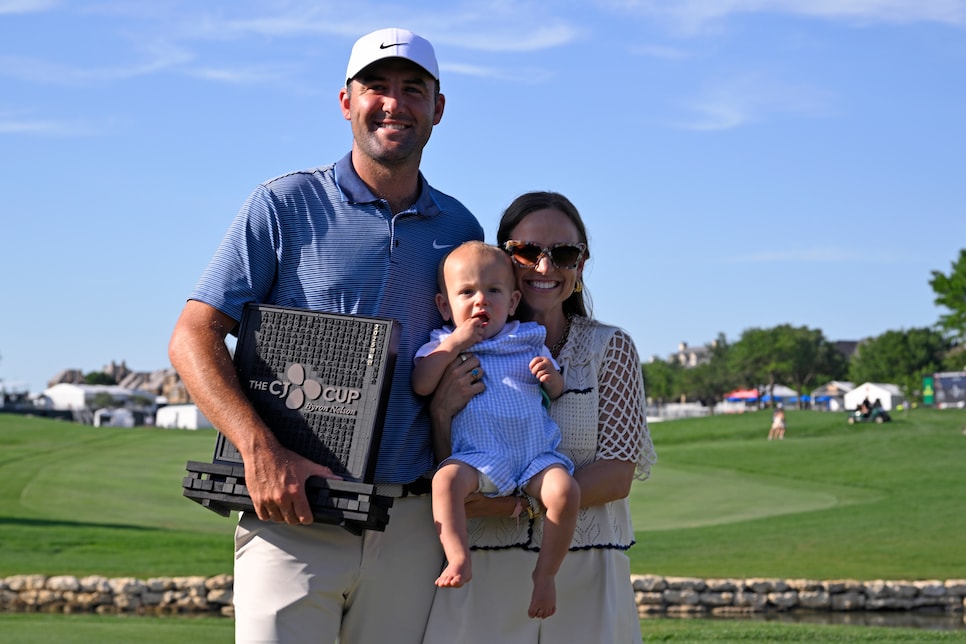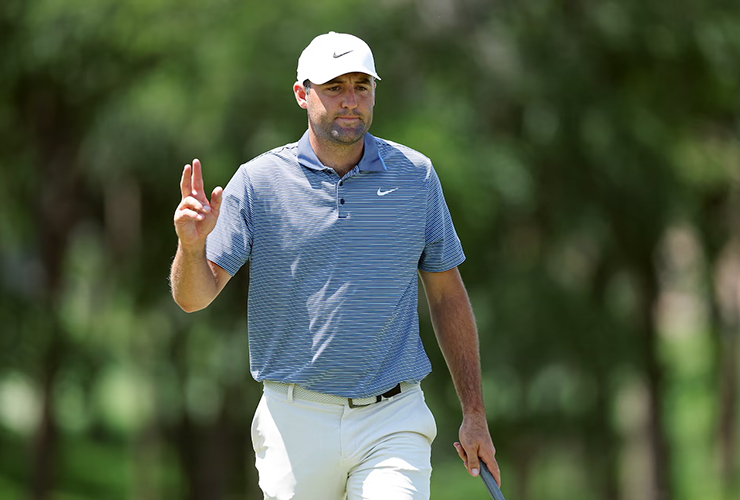The victory march ended with a whisper. There was a stubbed chip several holes prior, a missed putt at history; the champion offered just a perfunctory wave and casually dropped his ball during a fumbled attempt to pocket it. The anticlimactic finish from Scottie Scheffler was fitting, because dominance requires no exclamation point, his statement made through a ruthless accumulation of excellence that rendered the outcome inevitable long before the final stroke.
Ruthless. That’s the only fitting description. “Wire-to-wire” falls woefully short. Not when Erik van Rooyen, who played in the final group, shot a blistering 63 only to finish second by (checks notes) eight shots. Not when Jordan Spieth, whose own magnificent 62 breathed life into his Grand Slam pursuit, openly admitted he occupies an entirely different stratosphere than Scheffler. Not when Scheffler flirted with shooting 60 in three of four rounds. Not when this week confirmed that his three-year heater burns hotter than ever.
Scheffler authored a week for the ages, his final-round 63 tying the lowest 72-hole score in PGA Tour history (253) to capture the CJ Cup Byron Nelson in his hometown of Dallas.
It seems comical to suggest Scottie Scheffler is “back,” as if a player of his calibre could ever truly disappear. Beyond that brief, headline-grabbing “ravioli-induced sabbatical” earlier this year, Scheffler has remained golf’s immovable force. The numbers speak with devastating clarity: second in strokes gained, second in scoring, finishes in the top 10 across his previous four starts—including a runner-up in Houston and a fourth-place standing at Augusta National. Were it not for the works of a certain Northern Irishman, we’d be discussing Scheffler’s unprecedented fourth consecutive player of the year award rather than wondering if his dominance had somehow waned. The question was never if Scheffler would win again, but when.
Scottie's ranks this week:
1st in Proximity (28'1")
1st in Total Birdies (29)
1st in Par Breakers (44%)
1st in 3-Putt Avoidance (0)
1st in Putting Average (1.52)
1st in SG: Approach (+3.203)
1st in SG: Tee-to-Green (+4.243)
1st in Greens in Regulations (82%)
1st in Par 3 Scoring… pic.twitter.com/58odfDS9au— PGA TOUR (@PGATOUR) May 4, 2025
Yet dominance carries its own weight, forging expectations so astronomical that even the best can stagger beneath them. Scheffler’s 2024 campaign wasn’t merely historic; it was otherworldly—nine victories, a number that positions him alongside only Tiger Woods and Vijay Singh in modern golf’s pantheon. He didn’t just win tournaments, but where. He claimed a second green jacket at Augusta and became the first player ever to successfully defend at TPC Sawgrass. The rest of his victory tour hit signature events: Bay Hill, Harbour Town, Muirfield Village, TPC River Highlands, East Lake. When Paris called, Scheffler answered, standing atop the Olympic podium while his national anthem played at Le Golf National. His statistical dominance told the same story—first in scoring, first in strokes gained, with a machine-like 16 top-10 finishes in just 19 starts. Incredible, yes … yet there is no possible encore when you’ve already kissed the skies.
Scheffler discovered this when returning from injury. Despite assembling a resume that would constitute a career year for most players—four top-10s and nothing worse than 25th across eight starts—the absence of silverware became noteworthy. Each frustrated glance captured on camera, every club slam magnified through social media’s lens, transformed into supposed evidence of a champion unravelling. The golf intelligentsia began their whispered diagnosis: was something wrong, or was this simply the inevitable regression that stalks greatness?
The analysis was as lazy as it was predictable. Nothing fundamental had changed in Scheffler’s approach or ability—he has always burned with an internal fire that occasionally licks through his composed exterior. Those who framed these emotional fissures as something new merely broadcast their shallow understanding of the man they presumed to analyse. The simpler explanation required no complex psychology: winning at this level requires not just excellence but timing, fortune, and an almost supernatural convergence of skill and circumstance. Even for golf royalty, victory remains stubbornly, refreshingly elusive. Yesterday’s masterpiece offers no guarantee for tomorrow.
Yet even as headlines finally found him, true appreciation remained hard to find. Which is ironic; golf spent a decade-plus desperately searching for Woods’ heir, then collectively shrugged when that heir arrived. While the sport tore itself apart in an endless civil war between tours, its greatest active player quietly assembled a record worthy of golf’s pantheon.
An eagle to lead by EIGHT 😲
All gas, no brakes for Scottie Scheffler.
📺 CBS | @CJByronNelson pic.twitter.com/1WJ2lESK44
— PGA TOUR (@PGATOUR) May 4, 2025
The ultimate indictment of golf’s collective blindness? Dubbing Scheffler “boring.” In our attention-starved era, his refusal to self-promote became almost offensive. His sin is a precision so methodical and personality so genuine that excellence looked effortless, unworthy of click-bait. While golf’s loudest voices crave the swashbuckling hero who creates disaster before miraculous recovery, Scheffler operates with Special Forces efficiency—target acquired, mission executed, no unnecessary movement. It took the first hints of Scheffler’s dominance potentially fading for the game to recognise what had stood before them all along
So it’s easy to see how the ripple effects from this week extend far beyond Dallas. For Scheffler personally, this victory launches his campaign for a fourth consecutive season of transcendence—a stretch of sustained brilliance that finds its only modern parallel in Woods’s prime. For golf itself, the timing couldn’t be more perfect, with the PGA Championship on tap in eight days. The sport has hungered for a genuine heavyweight rivalry and now stands on the threshold of exactly that: Scheffler and McIlroy, talent against talent, will-against-will, across three remaining majors, the summer’s playoff series, culminating at Bethpage Black where American fans will transform the Ryder Cup into a gladiatorial spectacle. The supporting cast strengthens the brewing drama—Bryson DeChambeau flexing his own considerable muscles with a simultaneous victory on the LIV circuit, Xander Schauffele returning to full health, Justin Thomas rediscovering his form, Ludvig Aberg’s rise threatening to crash the established order, and Jon Rahm’s brooding intensity promising inevitable eruption. The next five months of golf can redefine what this sport looks like when the gettin’ is good.
RELATED: Here’s the prize money payout for each player at the CJ Cup Byron Nelson

Orlando Ramirez
Conversely, let’s not lose sight of what the game just witnessed, beyond what Scheffler did on his scorecard. The Byron Nelson holds a special place in Scheffler’s journey—it was here, 11 years ago, that a high school kid with tour-sized dreams first stepped inside the ropes as a PGA Tour competitor, his sister carrying his bag. It was here that a wide-eyed Scheffler pressed against gallery ropes. Life’s symmetry revealed itself when this tournament, missed last year while Scheffler embraced fatherhood, welcomed him off the 18th green—his infant son and wife Meredith waiting. Throughout four days of clinical performance, Scheffler’s emotions remained carefully contained behind that trademark stoicism. But when asked to articulate what this particular victory meant, the fortress crumbled, Schefflering finding himself defenceless against the tide of emotion that accompanies a moment dreamed about long ago.
“This tourney means a lot to me,” Scheffler said through tears moments after the win. “It feels like a lifetime of hard work and sacrifice for little moments like these, and they’re pretty special.”
What makes Scheffler captivating isn’t just the ruthlessness of his game but the vulnerability that emerges at such junctures. In wins at the Masters and Olympics, sure, but also in defeat, like we saw in Rome during the ’23 Ryder Cup. There’s something profoundly human in watching a merciless competitor surrender repeatedly to raw emotion. In that paradox lies Scheffler’s inevitability, because there is no keeping a man down who is true to himself.
Main Image: Sam Hodde









